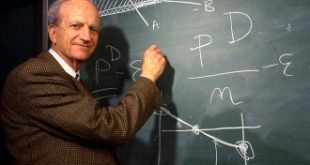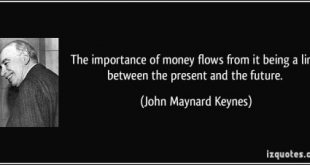I programmet Ekdal och Ekdal häromkvällen fick Sveriges finansminister — Magdalena Andersson — på bästa sändningstid möjlighet förklara hur vi ska kunna minska klyftorna i Sverige. Till min — och säkert flera andras — stora förvåning verkade fru Andersson vara mest intresserad av att försöka frammåla en bild av att problemen egentligen inte är så stora eftersom socialdemokratin har hållit den ‘svenska modellen’ — för att i grunden skapa ett jämlikt samhälle — levande: 1 Alla...
Read More »Bernard Lietaer (1942 — 2019)
Bernard Lietaer (1942 — 2019) [embedded content] Sad news reached us today that one of our greatest monetary thinkers, Bernard Lietaer, has passed away. RIP.
Read More »Gary Becker — making nonsense out of economic science
Gary Becker — making nonsense out of economic science The econometrician Henri Theil once said “models are to be used but not to be believed.” I use the rational actor model for thinking about marginal changes but Gary Becker really believed the model. Once, at a dinner with Becker, I remarked that extreme punishment could lead to so much poverty and hatred that it could create blowback. Becker was having none of it. For every example that I raised of...
Read More »IPA’s weekly links
If you’ve been wondering where Chris has been, all I know is that it seems to involve a Colombian unicornGuest post by Jeff Mosenkis of Innovations for Poverty Action First, congratulations to Dave Evans, everybody’s favorite public good generator, on his upcoming move to the Center for Global Development, where he’ll join an impressive bench, including Pam Jakiela, Susannah Hares, and Kristaps Porzingis. (And subscribe to his blog at that link for great book reviews, and other interesting...
Read More »Die Macht der Zahlen
Die Macht der Zahlen [embedded content]
Read More »Economics and reality
‘Modern’ economics has become increasingly irrelevant to the understanding of the real world. In his seminal book Economics and Reality (1997), Tony Lawson traced this irrelevance to the failure of economists to match their deductive-axiomatic methods with their subject It is — sad to say — as relevant today as it was twenty years ago. It is still a fact that within mainstream economics internal validity is everything and external validity nothing. Why anyone should be...
Read More »Så återskapar vi förtroendet för nationalekonomi som vetenskap
Så återskapar vi förtroendet för nationalekonomi som vetenskap Nationalekonomin som vetenskap har världen över förlorat otroligt mycket i prestige och status under senare år. Inte minst på grund av dess oförmåga att se den senaste finansiella krisen i antågande och på grund av dess avsaknad av konstruktiva och hållbara förslag på att ta oss ur krisen. Hur återskapar vi förtroendet för nationalekonomin? Fem förändringar är helt avgörande. (1) Sluta låtsas...
Read More »IPA’s weekly links
(From the video at the end of the post)Guest post by Jeff Mosenkis of Innovations for Poverty Action Oxfam releases a report around the same time as Davos every year on who owns what portion of global wealth. Their spin on it is designed to make headlines, but Dylan Matthews explains why it’s really hard to measure.Also in Vox, Stephanie Wykstra provides a nice plain-language summary of what the research says about microloans. A very cool very cross randomized experiment (more than 50...
Read More »Clint Ballinger — 1000 Castaways, Chapter 3: Balancing the Two Systems
Clint invites comments and critique. 1000 Castaways: Fundamentals of Economics, Economics, Macroeconomics1000 Castaways, Chapter 3: Balancing the Two Systems Clint Ballinger
Read More »Is money — really — neutral in the long run?
Is money — really — neutral in the long run? Paul Krugman has repeatedly over the years argued that we should continue to use neoclassical hobby horses like IS-LM and Aggregate Supply-Aggregate Demand models. Here’s one example: So why do AS-AD? … We do want, somewhere along the way, to get across the notion of the self-correcting economy, the notion that in the long run, we may all be dead, but that we also have a tendency to return to full employment via...
Read More » Heterodox
Heterodox






